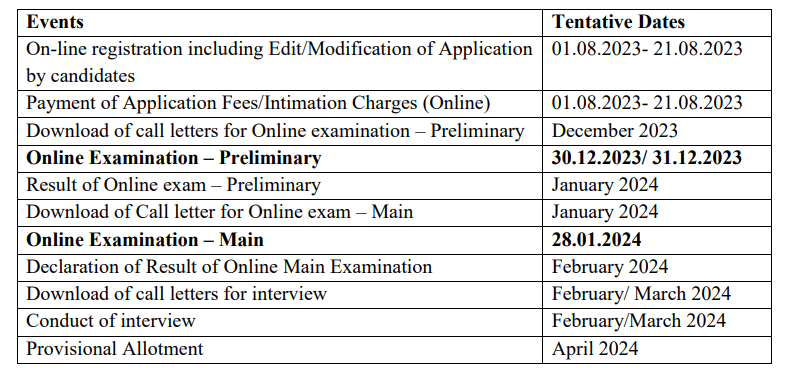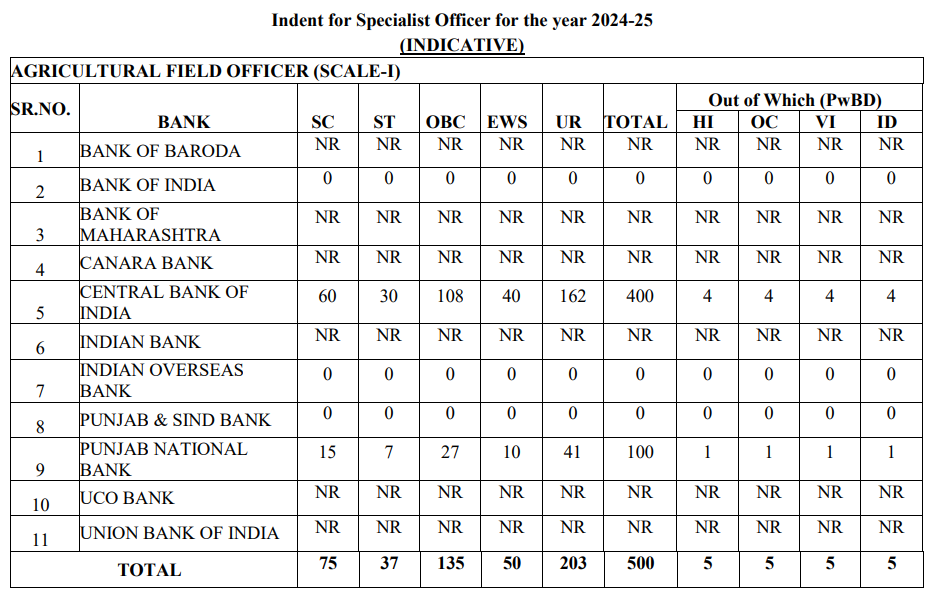IBPS AFO
The Institute of Banking Personnel Selection (IBPS) recruits for Agricultural Field Officer (Scale I) and Specialist Officer (SO) position and is primarily concerned with promoting bank financial goods and services to farmers and landlords in rural regions for agricultural reasons.
August 16th 2023, 12:38:06 pm | 5 min read

IBPS AFO
The Institute of Banking Personnel Selection (IBPS) Agricultural Field Officer (Scale I) and Specialist Officer (SO) position is primarily concerned with promoting bank financial goods and services to farmers and landlords in rural regions for agricultural reasons.
Examination conducting Body | Institute of Banking Personnel Selection |
Post | Agriculture Field Officer (AFO) |
Number of Vacancies | 500 vacancies |
Exam Level | National level Examination |
Selection Process | Prelims exam Mains exam Interview |
Exam Mode | Online (CBT) |
Official website of the Institute |
Participating Banks
i. Bank of Baroda
ii. Bank of India
iii. Bank of Maharashtra
iv. Canara Bank
v. Central Bank of India
vi. Indian Bank
vii. Indian Overseas Bank
viii. Punjab National Bank
ix. Punjab & Sind Bank
x. UCO Bank
xi. Union Bank of India
IBPS AFO Exam 2024 – Important Dates

IBPS AFO Recruitment – Selection Process
The selection process for IBPS AFO is given below:
- Preliminary Examination
- Mains Examination
- Interview
IBPS AFO Eligibility Criteria
IBPS AFO Recruitment – Age Limit
The minimum age of a candidate should be 20 years.
The maximum age of a candidate should not exceed 30 years.
Upper age relaxation will be provided to reserved categories as per rules and regulations.
Educational Qualification
The candidate must possess a Bachelor’s Degree in any of the following disciplines from a recognized University or Institution
4 year Degree (graduation) in any of them:
i.. Agriculture
ii. Horticulture
iii. Animal Husbandry
iv. Veterinary Science
v. Dairy Science
vi. Fishery Science
vii. Pisciculture
viii. Agri. Marketing & Cooperation
ix. Co-operation & Banking
x. Agro-Forestry
xi Forestry
xii. Agricultural Biotechnology
xiii. Food Science
xiv. Agriculture Business Management
xv. Food Technology
xvi. Dairy Technology
xvii. Agricultural Engineering
xviii. Sericulture
xix. Fisheries Engineering
xx. Students who are awaiting the final year result too can apply.
IBPS AFO Examination Pattern
Preliminary Examination Pattern
The examination pattern for the preliminary paper is mentioned below:
Subjects | No of Questions | Medium of Exam | Maximum Marks | Duration |
English Language | 50 | English | 25 Marks | 40 minutes |
Reasoning Ability | 50 | English and Hindi | 50 Marks | 40 minutes |
Quantitative Aptitude | 50 | English and Hindi | 50 Marks | 40 minutes |
Total |
|
| 125 Marks |
|
The duration of the examination is 2 hours (120 minutes).
Mains Examination Pattern
Subjects | No of Questions | Medium of Exam | Maximum Marks | Duration |
Professional knowledge | 60 | English and Hindi | 60 | 45 minutes |

IBPS AFO Syllabus for English language
i. Reading Comprehension
ii. Error Detection
iii. Cloze Test
iv. Antonym/Synonym
v. Sentence Rearrangement
vi. Fillers
vii. Phrase Replacement
IBPS AFO Syllabus for Quantitative Aptitude
i. Number System
ii. Time & Distance
iii. Problems on trains
iv. Mixtures & Allegations
v. Simple & Compound Interest
vi. Problems on Ages
vii. Pipes & Cisterns
viii. Ratio & Proportions
ix. Percentage
x. Permutation & Combination
xi. Time & Work
xii. Boats & Streams
xiii. Profit & Loss
xiv. DI
xv. Simplification & Approximation
IBPS AFO Syllabus 2023 for Reasoning
i. Puzzles
ii. Seating arrangement
iii. Coding-Decoding
iv. Input-Output
v. Direction Sense
vi. Blood Relation
vii. Syllogism
viii. Alpha Numeric Series
ix. Ranking test
IBPS AFO Mains Syllabus
i. Agriculture current affairs
ii. Crop horticulture vegetables
iii. Spacing time of sowing seed rate
iv. Varieties important only
v. Herbicides Pesticides
vi. Important points regarding plants fruits vegetables
vii. Preservation of fruits and vegetables
viii. Types of cropping system
ix. Different Diseases
x. Seed technology – Different government schemes
xi. Agriculture economics – Agriculture cost and schemes
xii. Various types of agricultural practices
xiii. Soil resources
xiv. Indian soil
xv. Types of facts ( like humus content, CN ratio etc)
xvi. Green manures
xvii. Animal husbandry and technology
xviii. Different breeds of animals
xix. Agriculture small industries like honey daily in the fisheries
xx. Various diseases and their causes
xxi. Rural welfare activities in India – Before independence and After independence
xxii. Different insurance schemes regarding agriculture
xxiii. Women and child development schemes
